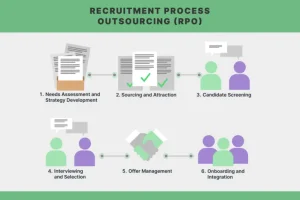
What is Recruitment Process Outsourcing (RPO)?
Recruitment Process Outsourcing (RPO) refers to outsourcing your recruitment process to third-party RPO provide or simply put, it is a strategic partnership between an organization and an external service provider, wherein the provider takes on the responsibility of managing some or all aspects of the company’s recruitment process. This arrangement allows businesses to leverage the resources and expertise of the RPO provider to enhance the efficiency and productiveness of their hiring procedures.
How Does Recruitment Process Outsourcing (RPO) Work?

RPO involves a series of well-defined steps that cater to the entire recruitment lifecycle, including the following:
Needs Assessment and Strategy Development:
- The RPO provider collaborates closely with the client to understand their hiring needs, organizational culture, and recruitment goals.
- A tailored recruitment strategy is developed, outlining the scope of the RPO engagement and the specific roles to be filled.
Sourcing and Attraction:
- The RPO provider employs a variety of sourcing methods, such as job boards, social media, and networking, to identify potential candidates.
- Engaging job descriptions and employer branding efforts are crafted to attract the right talent.
Candidate Screening:
- Initial candidate assessments are conducted, which may involve resume screening, skills testing, and preliminary interviews.
- Only the most qualified candidates are advanced to the next stages of the process.
Interviewing and Selection:
- The RPO provider may conduct initial interviews or facilitate interviews between candidates and the client’s hiring managers.
- Comprehensive candidate profiles are shared with the client, helping them make informed decisions.
Offer Management:
- The RPO provider assists in crafting competitive offers that align with industry standards and the client’s budget.
- Negotiations and communication with candidates are managed, ensuring a seamless offer acceptance process.
Onboarding and Integration:
- The RPO provider facilitates the onboarding process, ensuring that new hires are integrated smoothly into the client’s organization.
- This step helps improve retention rates and enhances the overall candidate experience.
Benefits of Recruitment Process Outsourcing (RPO)
Recruitment Process Outsourcing offers a range of advantages that contribute to an organization’s success in acquiring top talent and retaining it in the longer run. Some of the salient advantages of RPO include the following:
Expertise and Scalability:
- RPO providers are seasoned experts in the field, equipped with up-to-date knowledge of recruitment trends and strategies.
- The RPO model can easily scale to accommodate fluctuating hiring needs, without burdening the internal HR team.
Cost-Efficiency:
- RPO eliminates the need for hefty investments in recruitment infrastructure, technology, and personnel.
- A streamlined process reduces time-to-fill metrics, preventing prolonged job vacancies that can be costly for the business.
Access to Technology:
- RPO providers often utilize advanced recruitment technologies, including applicant tracking systems (ATS) and AI-driven screening tools.
- This technology enhances the accuracy and efficiency of candidate selection.
Focus on Core Activities:
- By outsourcing recruitment tasks, internal HR teams can focus on strategic initiatives and core HR functions that drive organizational growth.
Enhanced Candidate Quality:
- RPO providers are dedicated to finding the best-fit candidates through rigorous screening and evaluation processes.
- This leads to higher-quality hires and improved long-term employee performance.
Key Considerations for Implementing RPO
Before embarking on an RPO partnership, organizations should carefully consider several factors that could help them get the best out of RPO. Some of the noteworthy points include the following:
1. Clear Communication:
- Establish open and transparent communication channels with the RPO provider to ensure alignment with your company’s values, goals, and expectations.
2. Data Security and Compliance:
Ensure the RPO provider follows industry best practices for data security and compliance with relevant regulations, such as GDPR.
3. Customization and Flexibility:
- Look for an RPO provider that offers customized solutions to suit your unique recruitment needs and can adapt to changing requirements.
4. Performance Metrics and Reporting:
- Define key performance indicators (KPIs) to measure the success of the RPO engagement, such as time-to-fill, candidate quality, and cost per hire.
5. Cultural Fit Assessment:
- Collaborate with the RPO provider to ensure they understand your organization’s culture, as cultural alignment is crucial for successful hires.
6. Transition Management:
- Plan a smooth transition from in-house recruitment to the RPO model, involving adequate training and knowledge transfer.
Conclusion
In sum, the recruitment process has emerged as a boon for the recruiters/employers seeking to optimize and streamline their recruitment efforts. The partnership with third-party RPO providers enables organizations to tap into a wealth of recruitment knowledge, expertise and advanced technologies to streamline their recruitment process. This partnership not only leads to better candidate quality and improved time-to-fill metrics but also empowers internal HR teams to focus on strategic initiatives. For evolving businesses, embracing RPO can provide a competitive edge in attracting and retaining top-tier talent.
